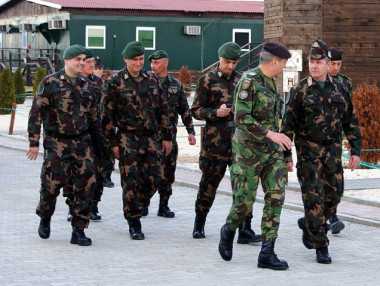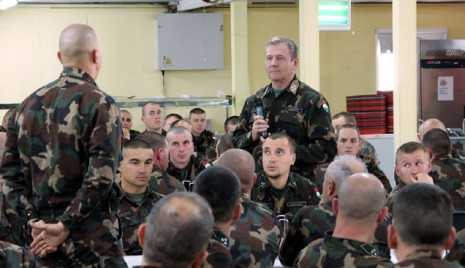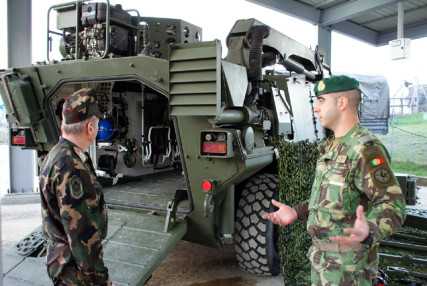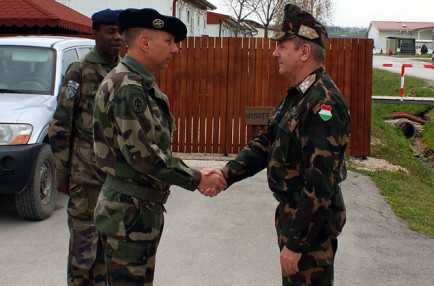Hungarian Chief of Defence Visits the Balkans
Szöveg: Defence Staff | 2014. április 1. 9:00Gen. Dr. Tibor Benkő, the Chief of the Defence Staff paid a three-day visit to the Balkans in order to learn about the operational and service conditions as well as the already completed and scheduled tasks of the Hungarian military forces serving in the Balkans Joint Operational Area (JOA).

Gen. Dr. Tibor Benkő inspected Camp Slim Lines, Pristina, where the Hungarian contingent is stationed
On Friday, March 28 Gen. Dr. Tibor Benkő, the Chief of the Defence Staff traveled to the Balkans Joint Operational Area (JOA) to inspect the Hungarian troops serving there. This three-day visit to Kosovo and Bosnia-Herzegovina by the Hungarian Chief of Defence is also important because the Hungarian Defence Forces are deploying their largest contingents in the ongoing Balkans operations. Altogether around 365 Hungarian soldiers are serving in the Balkans JOA, that is, with KFOR in Kosovo and EUFOR in Bosnia-Herzegovina as well as at the headquarters of these missions.
On March 28, the Chief of the Defence Staff first traveled to Pristina, where he held a discussion with Gen. Anton Wessely, the Deputy Commander of KFOR about NATO’s current role in the Kosovo mission, the Hungarian participation and the tasks for the future.
In what followed, Gen. Benkő met the Hungarian staff officers working at the KFOR HQ, and held a staff meeting at Camp Slim Lines, where the Hungarian contingent serving in Kosovo is stationed. Finally he met the Portuguese commander of the camp to discuss current issues with him.

Staff meeting in Camp Slim Lines
The present visit by the Hungarian Chief of Defence has special significance because, in accordance with earlier agreements, from this June on Hungary is going to send more troops to Kosovo to increase its presence there. A key objective of the visit was to pave the way for this troop increase which is due in the near future. With this end in view, the Chief of Defence visited Camp Novo Selo, the designated duty station of the troops to be deployed. He inspected the future area of operations and the billeting areas, and held a discussion with the French leaders of the camp.
Building up Hungarian military presence in the Balkans is necessary because the stability of the Western Balkans region is a priority in Hungary’s security agenda.

The Portuguese peacekeepers serving with the same battalion as the Hungarians showed the military equipment in service with the unit
Despite the overall positive developments, the stabilization process in the Western Balkans is not irreversible yet, as witnessed by the recurring acts of violence over the last 18 months. There is still a possibility of sporadic ethnic incidents in Kosovo, so the presence of international military and police forces will be needed in the future too. At the same time, KFOR is the only representative of the international community whose activity is recognized and respected by all those involved in the crisis.
In the second half of his tour of the Balkans, Gen. Tibor Benkő visited the EUFOR forces stationed in Bosnia-Herzegovina, as altogether around 165 Hungarian soldiers are currently serving in Sarajevo.

The Chief of the Defence Staff met the French commander of Camp Novo Selo as well
Photos: Defence Staff